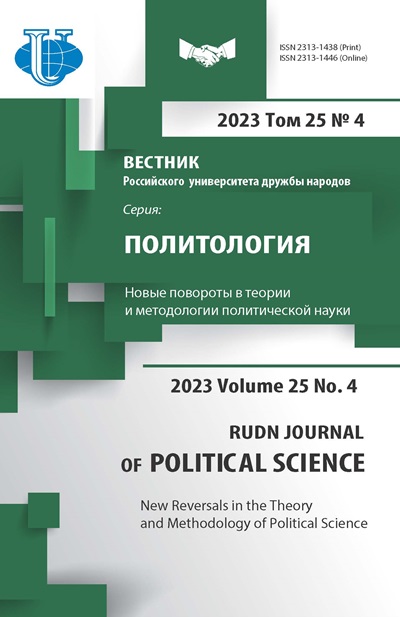The “Third Generation” Constructivism: Framing and Communication
- 作者: Alekseeva T.A.1, Verkhovskaya Z.A.1
-
隶属关系:
- MGIMO University
- 期: 卷 25, 编号 4 (2023): New Reversals in the Theory and Methodology of Political Science
- 页面: 801-816
- 栏目: THE WORLD OF THE POLITICAL
- URL: https://journal-vniispk.ru/2313-1438/article/view/322197
- DOI: https://doi.org/10.22363/2313-1438-2023-25-4-801-816
- EDN: https://elibrary.ru/QKUFPR
- ID: 322197
如何引用文章
详细
The research is devoted to the consideration of some new methodological trends in the constructivism of the “third generation” of scientists. Its representatives, while remaining committed to the basic postulates of constructivism, at the same time turned their main attention to issues related to the theory of communication to framing as one of the ways of constructing reality and saturating it with certain meanings. Based on Martin Buber’s theory of dialogue, constructivists draw attention to the dangers of universalism in the study of politics as a prerequisite and even a manifestation of the ideological fixation of certain concepts, positions, and theses. Meanwhile, the formation of a community as “we” presupposes a pluralism of approaches and recognition of different points of view, and at the same time “cleaning” the information space of many frames that allow, through the manipulation of “fakes,” stereotypes and false stories, to form an idea of reality that significantly distorts it and even modifying.
作者简介
Tatyana Alekseeva
MGIMO University
Email: ataleks@mail.ru
ORCID iD: 0000-0002-6561-2281
Doctor of Philosophy, Professor, Honored Scientist of the Russian Federation, Head of the Department of Political Theory
Moscow, Russian FederationZhanna Verkhovskaya
MGIMO University
编辑信件的主要联系方式.
Email: zh.a.verkhovskaya@inno.mgimo
ORCID iD: 0000-0002-3229-0415
Candidate of Cultural Studies - Associate Professor of the Department of Political Theory
Moscow, Russian Federation参考
- Berger, P.L., & Luckmann, T. (1995). The social construction of reality. Moscow: Medium. (In Russian).
- Buber, M. (1993). Me and You. Moscow: Higher School. (In Russian).
- Finnemore, M., & Sikkink, К. (2001). Taking stock: The constructivist research program in international relations and comparative politics. Annual Review of Political Science, 4(1), 391–416.
- Fiske, S.T., & Taylor, S.E. (1991). Social Cognition. NY: McGraw-Hill.
- Gallie, W.B. (1956). Essentially contested concepts. Proceedings of the Aristotelian Society, 56, 167–198.
- Goffman, E. (1974). Frame analysis: An essay on the organization of experience. Boston: Northeastern University Press.
- Habermas, J. (1987). The philosophical discourse of modernity. Cambridge (Mass.): MIT Press.
- Jordan, J., Stulberg, A., & Troitskiy M. (2021). Statecraft in U.S. — Russia relations. International processes, 19(1), 6–25. (In Russian). https://doi.org/10.17994/IT.2021.19.1.64.6
- Kalinina, A.S. (2020). The concept of the other and ethics in the philosophy of E . L evinas. Bulletin of Chelyabinsk State University, 56(439), 124–129. (In Russian). https://doi.org/10.24411/1994-2796-2020-10516
- Levinas, E. (2006). Emmanuel Levinas: The path to the Other. In Collection of articles and translations dedicated to the 100th anniversary of the birth of E. Levinas (pp. 177–180). St. Petersburg: Publishing House of St. Petersburg University. (In Russian).
- Luhmann, N. (2004). Die Gesellschaft der Gesellschaf [Society as a social system]. Part 1. Moscow: Logos. (In Russian).
- Matthews, M. (2000). Time for Science Education. How Teaching the History and Philosophy of Pendulum Motion Can Contribute to Science Literacy. NY: Kluwer academic plenum publishers.
- McQuail, D. (2005). McQuail’s mass communication theory. London: Sage.
- Mouffe, Ch. (1996). Deconstruction, pragmatism and the politics of democracy. In C h. Mouffe (Ed.), Deconstruction and Pragmatism. London-NY: Routledge. https://doi.org/10.4324/9780203431481
- Neubert, S., & Reich, K. (2001). The ethnocentric view. Constructivism and the practice of intercultural discourse. In B. Cope & M. Kalantzis (Eds.), Learning for the Future. Proceeding of the Learning Conference. Spetses: Dimotiko Skolio of Spetses.
- Onuf, N.G. (1989). World of our making: Rules and rule in social theory and international relations. Columbia: University of South Carolina Press.
- Reich, K. (1998). Die Ordnung der Blicke. Perspektiven des interaktionistischen Konstruktivismus, Bd. 1. Beobachtung und die Unscharfen der Erkenntnis. Bd. 2. Beziehungen und Lebenswelt. Neuwied u.a.: Luchterhand.
- Rockmore, T. (2005). On Constructivist Epistemology. Lanham: Rowman and Littlefield.
- Scheufele, B. (2004). “Framing-effects Approach: A theoretical and Methodological Critique”. Communications, (29), 401–428.
- Smorgunov, L.V. (2020). Ontological turns in contemporary political science: in search for compliance with politics. Social and humanitarian knowledge, 6, 122–133. (In Russian). http://dx.doi.org/10.18255/2412-6519-2020-2-122-133
- Subotic, J., & Zarakol, A. (2013). Cultural Intimacy in International Relations. European Journal of International Relations, 19(4), 915–938.
- Van Gorp, B. (2007). “The Constructivist Approach to Framing: Bringing Culture Back In”. Journal of Communication, 57, 60–78.
- Zarakol, A. (2017). “TRIPping Constructivism”. Political Science, 50, 75–78. https://doi.org/10.1017/ S1049096516002183 .
补充文件








